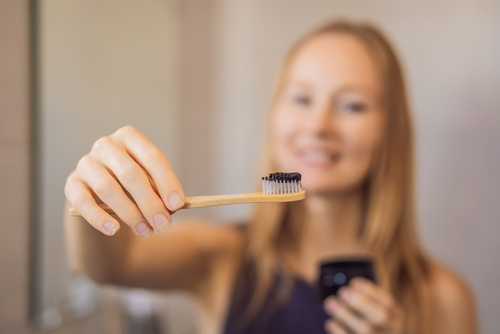The use of teeth whitening products is growing rapidly, and it appears to be gaining popularity with each passing year. By 2030, the Grand View Research Market Analysis Report predicts that the market size for teeth whitening in the United States will reach around $10.6 billion! With this boom in whitening trends, people are trying more and more ways to brighten their smile. A common trend nowadays is to use charcoal whitening products. With even big brands like Colgate and Crest advertising charcoal’s natural whitening properties, patients like you are left wondering: Does charcoal whiten teeth? While it may seem like a simple question, the answer is a bit more complex than one might expect.
Before trying charcoal toothpaste products, we at St. Apollonia Dental recommend understanding what charcoal actually does to determine if it’s safe for your smile.
Does Charcoal Toothpaste Whiten Your Teeth? Well, Kind of….
 Charcoal is made from materials like wood or coconut shells. However, in toothpaste, the charcoal is activated, meaning it’s been heated to high temperatures.
Charcoal is made from materials like wood or coconut shells. However, in toothpaste, the charcoal is activated, meaning it’s been heated to high temperatures.
Then, by applying it to your toothbrush and brushing your smile, charcoal may make your smile appear whiter.
Unlike other whitening methods, charcoal doesn’t have any fluoride or other properties that change the color of your teeth. Instead, it’s extremely porous, giving it an abrasive texture.
Big brands like Colgate and Crest market charcoal toothpaste as an effective whitening product. But here’s how it actually works. When in toothpaste, charcoal rubs against the enamel of your teeth and scrapes off the top layer. Due to the regular wear and tear of life, this layer is likely stained, appearing slightly yellow in color. By removing the top layer of enamel, charcoal reveals the whiter enamel underneath, brightening your smile!
However, the so-called “whitening effect” of charcoal is due to the removal of your enamel, not the stains that affect it.
Does Charcoal Toothpaste Whiten Your Teeth Safely? No.
Initially, using charcoal toothpaste will brighten your smile.
Unfortunately, the effect won’t last. Since charcoal doesn’t actually whiten your teeth, this new layer of enamel will eventually stain. When you use your charcoal toothpaste again, you may find that the whitening effect is less effective. Typically, the more you brush with charcoal, the less white the results will be!
Underneath your enamel lies yellowish dentin. This sensitive inner layer is protected by enamel, lying just beneath the surface of your white smile. As you slowly chip away at your enamel, your dentin will become increasingly exposed. This yellowish tint totally undermines any whitening effect charcoal may provide, and endangers your oral health!
Currently, there is insufficient research on charcoal toothpaste for the American Dental Association (ADA) to approve or reject it as a safe whitening tool. However, the ADA has developed a standardized scale of abrasiveness for toothpaste, allowing patients like you to determine which products are safe to use.
For the ADA to approve a toothpaste, it must have a Relative Dentin Abrasivity (RDA) of less than 250. Anything higher has the potential to damage your enamel. Charcoal is considered highly abrasive, potentially endangering the health of your smile!
Considering how charcoal affects your enamel, its potential RDA, and the fact that once removed, enamel never regrows, most dentists advise patients against using charcoal for teeth whitening.
How To Whiten Your Smile Safely and Effectively
So, what are professional dentists, like those at St. Apollonia, recommending to whiten your smile?
1) Brush your teeth with fluoride toothpaste.
While many people believe that “natural” means safe to use and “chemical” means toxic, this isn’t always the case.
Fluoride is a naturally occurring chemical that has proven health benefits, including strengthening your teeth and protecting you from cavities! After all, the ADA will only approve toothpastes with fluoride, which most charcoal toothpastes don’t use.
We recommend brushing your teeth at least twice a day with a soft-bristle brush using fluoride toothpaste.
2) Flossing on a regular basis.
No matter how well or often you brush your teeth, there are always crevices that bristles can’t reach.
Flossing, however, helps you get in between your teeth and clean areas of your smile that are more difficult to access! We recommend flossing regularly to remove any food particles stuck between your teeth promptly.
Additionally, many patients find it easier to use a water flosser, rather than regular dental floss. This gentle stream of water effectively cleans between your teeth without risking damage to your gums.
3) Attend professional teeth cleanings.
At St. Apollonia Dental, we recommend that all patients attend routine dental visits every six months. We provide professional cleanings that keep your smile happy and healthy, cleaning areas that are otherwise difficult to reach.
These cleanings are essential for oral hygiene care, even for those who brush and floss regularly.
Whiten Your Teeth in Sterling Heights at St. Apollonia Dental!
If you want to join the trend of teeth whitening, we encourage you to consult with a dental professional before trying any abstract whitening methods. While even big brands offer charcoal toothpaste, it’s essential to note that the ADA has not approved charcoal toothpaste as an effective whitening product. Even if you wish to try whitening methods like charcoal toothpaste, it’s important to understand that this is in no way a substitute for routine dental hygiene!
Book a free consultation with St. Apollonia Dental to explore safe whitening methods that brighten your smile.

